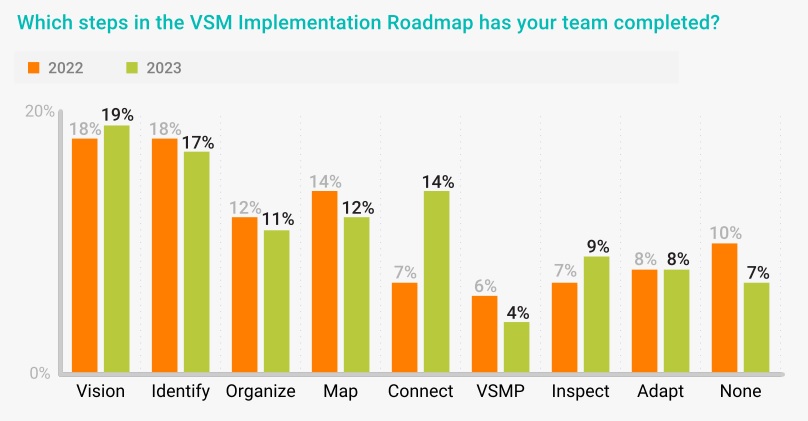AWS announced the preview of the Amazon Q Developer integration in GitHub.
The Value Stream Management Consortium recently released our third annual report, The State of Value Stream Management 2023. This year's report provides insights into how VSM adoption is increasing and how these practices drive higher levels of organizational performance.

Key findings in the 2023 report include:
■ A 15% increase in the practice of continuous value measurement.
■ Teams are twice as likely to have connected their value streams in 2023 than in 2022.
■ Connecting value streams means teams are 4x as likely to have a lead time of less than one hour.
■ Elite performers are twice as likely to be using a VSMP (Value Stream Management Platform) as low or medium-performers.
■ Elite and high performers are 20% more likely to measure value outcomes often or always than low or medium performers.
■ Elite and high performers are 3-4x more likely to align people to value streams than low performers.
The third year of a report is critical to seeing whether hypothesized trends actually exist and it's been very rewarding to see such a profusion of indicators that many more organizations are actively adopting value stream management.
Not only that, but the data shows over and over how these practices drive higher levels of organizational performance. Having just heard from this year's practitioner speakers at Flowtopia from BECU, Deutsche Telekom, Netflix, Parchment, Shutterstock, Telstra, and Unum how they are moving the needle in their own organizations, it's not a surprise, but it helps us as a community to collectively understand why these ways of working are so critical to us creating a more successful, sustainable and scalable future using value streams. This is how we can help to promulgate the practices for everyone's benefit, customer and business alike.”
This year's research focuses on Leading with Value and reports in four sections:
1. Planning for Value Delivery
2. Delivering Value
3. Measuring Value
4. Leading with Value
The report highlights how VSM adoption is increasing with advancements across the VSM implementation roadmap, an increase in the practice of creating value hypotheses, more organizations organizing around value streams, more people aligning to value streams, and increased adoption of Value Stream Management Platforms (VSMPs).
In our first report in 2021, we introduced our VSM Implementation Roadmap which we updated in 2022 based on feedback from our members. In 2023, we are introducing a new step — Assess — borne from the work that we have been doing with our Consulting Huddle at the VSMC and the importance of being able to both baseline the current state when embarking on a journey, and being able to measure progress as an organization progresses on their journey.

The VSM implementation roadmap – Click on image for larger version
In 2022 we also asked survey respondents for the first time which steps in the implementation roadmap they had completed. The most dramatic change for this year is on the Connect step, where we have more than double the responses than in 2022, pointing to the other evidence we have seen for the uptick in the technologies that support these practices and people learning how the data in their DevOps toolchains can be extracted and inspected. We also saw a drop from 10% to 6.9% in the volume of respondents who said that they had completed none of these steps.

The research uncovered that higher performance organizations are more likely to be organizing around value streams, creating value hypotheses and doing this earlier in the product life cycle, focused on customer-centricity, accelerating flow, measuring the actual value realized by their work, and using a Value Stream Management Platform (VSMP).

VSM adoption is increasing because it drives organizational performance by aligning teams and organizations, making work visible, generating insights, measuring progress and journeys, and having joy at its heart. The VSM renaissance is underway — the question is, when will it be mainstream?
Industry News
The OpenSearch Software Foundation, the vendor-neutral home for the OpenSearch Project, announced the general availability of OpenSearch 3.0.
Wix.com announced the launch of the Wix Model Context Protocol (MCP) Server.
Pulumi announced Pulumi IDP, a new internal developer platform that accelerates cloud infrastructure delivery for organizations at any scale.
Qt Group announced plans for significant expansion of the Qt platform and ecosystem.
Testsigma introduced autonomous testing capabilities to its automation suite — powered by AI coworkers that collaborate with QA teams to simplify testing, speed up releases, and elevate software quality.
Google is rolling out an updated Gemini 2.5 Pro model with significantly enhanced coding capabilities.
BrowserStack announced the acquisition of Requestly, the open-source HTTP interception and API mocking tool that eliminates critical bottlenecks in modern web development.
Jitterbit announced the evolution of its unified AI-infused low-code Harmony platform to deliver accountable, layered AI technology — including enterprise-ready AI agents — across its entire product portfolio.
The Cloud Native Computing Foundation® (CNCF®), which builds sustainable ecosystems for cloud native software, and Synadia announced that the NATS project will continue to thrive in the cloud native open source ecosystem of the CNCF with Synadia’s continued support and involvement.
RapDev announced the launch of Arlo, an AI Agent for ServiceNow designed to transform how enterprises manage operational workflows, risk, and service delivery.
Check Point® Software Technologies Ltd. announced that its Quantum Firewall Software R82 — the latest version of Check Point’s core network security software delivering advanced threat prevention and scalable policy management — has received Common Criteria EAL4+ certification, further reinforcing its position as a trusted security foundation for critical infrastructure, government, and defense organizations worldwide.
Postman announced full support for the Model Context Protocol (MCP), helping users build better AI Agents, faster.
Opsera announced new Advanced Security Dashboard capabilities available as an extension of Opsera's Unified Insights for GitHub Copilot.




